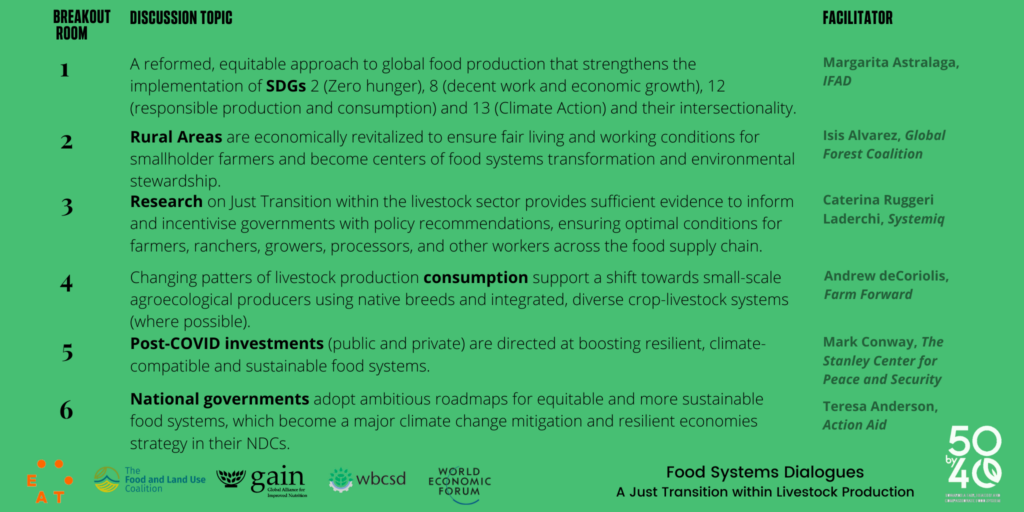The COVID-19 pandemic has highlighted the fragility of our current food system, making resilient food pathways critical in the ‘new normal’. A Just Transition has to be at the core of such an equitable and resilient food system, facilitating the transition away from the most unsustainable forms of livestock production, while aiding the implementation of the Sustainable Development Goals. Mapping pathways to an equitable transition for farmers, growers, processors, and other workers across the food supply chain is pivotal within livestock production and affiliated production systems.
To this end, on 30 June 2020, 50by40 convened a high-level independent Food Systems Dialogues event ‘A Just Transition Within Livestock Production.’ The online event, which was the first of its kind, brought together key stakeholders across the globe to discuss how the Just Transition strategy can be successfully embedded in the efforts to achieve a resilient food system.
With the participation of 73 experts, spanning 53 organisations, the event saw representation from different and diverse sectors, while leaving room for future growth.
Introduction to Food System Dialogues by Lasse Bruun
The dialogue centred around six key aspects of a Just Transition. The key learnings of the FSDs conversations highlight the exigency to address different levers of change, such as education and knowledge (research), policy and regulation, finance, market structures, citizen engagement and behaviour:
- A just approach to global food production must involve international governments working together, especially when formulating trade regulations.
- To revitalize rural areas, farmers must be recognised as essential and dignified. Policies must also be context-specific, recognizing the needs and vulnerabilities of different communities.
- For research to effectively provide sufficient evidence to governments and policymakers, we must identify holes in existing research as well as how to get appropriate funding.
- There must be a shift away from factory farming. Also, work needs to be done to create a strong economic case for sustainable agro-ecological farming, especially in the light of COVID-19.
- Post COVID-19 investments play a huge role in boosting a future of food that is eco-friendly and nutritionally beneficial to humans. This involves creating innovation at the farmer level, coordinating messages to the investment community and shortening supply chains.
- COVID-19 highlights the urgency to shift towards a more resilient food system. A Just Transition dialogue must be included in upcoming policy conversations on food systems resilience to influence policymakers.
Other key resources to the event can be found below
Topic for Discussion at the Event


With this and future dialogues, 50by40 aims to curate a conversation which ensures a Just Transition is a core part of the process of transforming our food systems.
If you are interested in our work on Just Transition, please contact the 50by40 Secretariat.
Follow us on Twitter to stay updated on our forthcoming initiatives and events.
